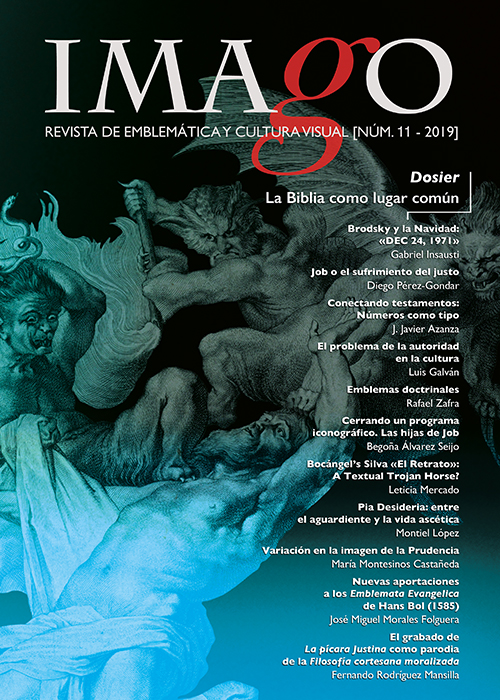Job o el sufrimiento del justo / Job or the Suffering of the Rightteous
DOI:
https://doi.org/10.7203/imago.11.16063Palabras clave:
Job, Sufrimiento, Dolor, Sentido, Relectura, Estructura literaria. Resumen
Resumen
ABSTRACT: The question about the meaning of the suffering of the innocent is inescapable. In the biblical tradition, this subject is treated in a particularly profound way in the book of Job. Paradoxically, this book is little known. This article describes the elements that articulate this book according to its complex structure and its poetic peculiarity. That understanding helps to explain the various interpretations and re-readings that this work experienced in Judaism of the pre-Christian period, in the origin of Christianity and in later Rabbinism. Since the central theme is always current, this work helps readers to better read this biblical book and makes them understand its importance and transcendence in the history of Western culture.
KEYWORDS
Job; Suffering; Pain; Meaning; Rereading; Literary Structure.
RESUMEN: La pregunta acerca del sentido del sufrimiento del inocente es ineludible. En la tradición bíblica, este tema es tratado de un modo particularmente profundo en el libro de Job. Paradójicamente, este libro es poco conocido. Este trabajo describe los elementos que articulan este libro atendiendo a su estructura compleja y a su peculiaridad poética.
Esa comprensión ayuda a explicar las diversas interpretaciones y relecturas que esta obra experimentó en el judaísmo del período precristiano, en el origen del cristianismo y en el rabinismo posterior. Como el tema central es siempre actual, este trabajo ayuda al lector a leer mejor este libro bíblico y hace comprender su importancia y trascendencia en la historia de la cultura occidental.
 Descargas
Descargas
Descargas
Publicado
Cómo citar
-
Resumen725
-
PDF3339
Número
Sección
Licencia

Este obra está bajo una licencia de Creative Commons Reconocimiento-NoComercial-SinObraDerivada 3.0 Unported.
Los autores conservan los derechos de autor y garantizan a la revista el derecho de ser la primera publicación del trabajo.
Los/as autores/as podrán depositar sus contribuciones en repositorios institucionales o de acceso abierto de cualquier otro tipo, con un reconocimiento de su publicación inicial en esta revista, y conservarán el derecho a utilizarlas con fines académicos, de investigación y educativos.


